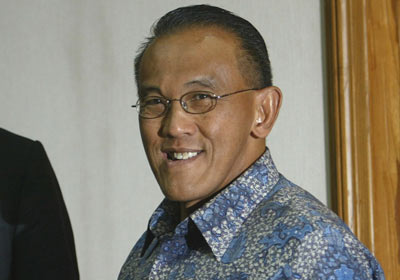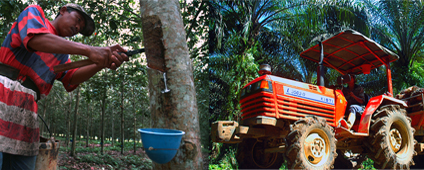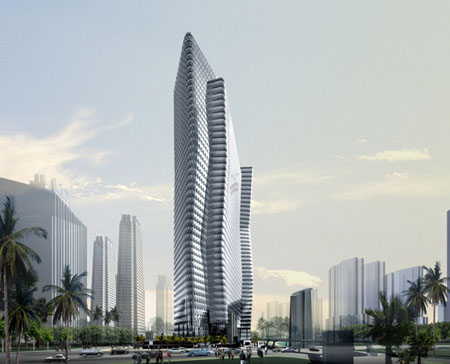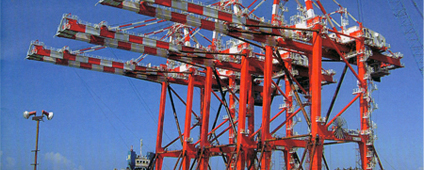Asia Sentinel Correspondent
Part of a continuing series on the impact of the financial and economic crisis on the Asia Pacific.
Back in June 2006 Indonesian environment watchdog Walhi urged the government to shutdown and investigate PT Lapindo Brantas’ gas prospecting operation in East Java after a botched drilling operation that caused hot toxic mud to flood surrounding land and to poison local villagers. By mid-2008 some 50,000 people had fled their homes. An international team of scientists who studied the phenomenon is convinced that the mudflow is an “unnatural disaster.” Lapindo, as the article mentions, was then part of the conglomerate owned by Indonesian billionaire and member of President Susilo Bambang Yudhoyono’s cabinet, Aburizal Bakrie. Sale of Lapindo in 2006 was widely viewed in Indonesia as an attempt by Bakrie to reduce his financial exposure.
Bakrie’s career neatly strides the authoritarian Suharto years of which he was a major beneficiary and the current era of elected presidents. As an “indigenous” Arab-Indonesian rising in the family enterprise founded by his father, the younger Bakrie gained favored access to state contracts, concessions and bank finance. Among other accolades, Bakrie was chosen in 1986 by the Kobe Junior Chamber of Commerce as one of the Outstanding Young People of the World.
Notably, from the age of 46, Bakrie served two consecutive terms from 1994 to 2004 as president of the influential Indonesia Chamber of Commerce (KADIN). Appointed in 2004 as senior economics minister by a government that purported to eschew corruption, Bakrie re-emerged in a cabinet reshuffle in 2005 as Indonesia’s senior welfare minister. As a member of Golkar, the largest party in the parliament, he competed unsuccessfully in 2004 to become that party’s candidate for the presidency.
A true conglomerate, the Bakrie group ranges across such enterprises as agribusiness (plantations), real estate, trade, shipping, banking, insurance, telecommunications, infrastructure, manufacturing, construction and mining. Bakrie’s Bumi Resources is one of the world’s largest thermal coal companies. Running up a US$1.1 billion debt during the Asian Financial Crisis in 1997, the conglomerate nevertheless survived following a refinancing process in 2000 that settled at an average of about 20 cents on the dollar. According to an Indonesian business magazine, prior to the latest crisis, the Bakries were worth US$9.2 billion. [1] Among Bakrie’s international partners are Mitsubishi Kasei Corp., Freeport McMoran of the US, and Australia’s BHP Pty.
Prior to its suspension by the Indonesian stock exchange, the Bakrie Group occupied one third of daily trade. Indonesian economists argue that the recovery of the Indonesian market depends upon solving the Bakrie problem. Meanwhile, Bakrie claimed it was in discussions with local and international players to absorb some of the US$1.25 billion debt wracked up during the October crisis, just as Indonesia’s Central Bank unveiled measures to raise dollar liquidity to help boost sentiment for the ailing rupiah. Bakrie’s Bumi Resources, Sumatra Plantations, and Telecom and Energy, look the most likely candidates for foreign acquisition, just as the shake out in Indonesia is bound to ramify in other sectors. Comment by Japan Focus
[1] John Aglionby, “Indonesia suspends trade again to quash rumours,” The Financial Times, 12 October 2008.
The Jakarta Stock Exchange remains closed after Bakrie Group companies were suspended from trading amid allegations of irregularities
Indonesia’s billionaire Chief Welfare Minister Aburizal Bakrie, whose companies are already being held responsible for the biggest man-made environmental disaster in Indonesian history, is now in trouble for playing a major role in wrecking the country’s stock market, which has been closed for three days.
Six companies controlled by the powerful Bakrie Group were suspended from trading Tuesday on the Indonesia Stock Exchange in the wake of wild gyrations in prices that drove the group’s shares down by 30 percent.
The exchange has ordered a probe into trading of the shares, with traders and analysts openly saying the stocks had been manipulated to drive up their price. Lenders to the Bakrie Group, wary after being burnt the first time his empire collapsed after the 1997 Asian financial crisis, are believed to have sought his family companies’ stock as collateral. The stock comes with stringent conditions and bankers worry that some loan covenants may be triggered if the stock remains untradeable. The group has not disclosed what the conditions of group loans are.
Given Bakrie’s political clout and the fact that his companies have routinely escaped scrutiny by government officials, it is questionable how far the investigation will go. However, the disastrous blowout of a Bakrie-controlled gas well two years ago and the environmental damage it did, plus other problems, may have made him less than welcome in the cabinet of President Susilo Bambang Yudhoyono, who has made reducing corruption a major goal of his administration. The country’s indefatigable Corruption Eradication Commission has been arresting politicians right and left.
The exchange’s benchmark composite index plummeted more than 21 percent this week, the biggest three-day fall in 20 years as major foreign investors pulled back from emerging markets, and particularly those as dicey as Indonesia’s. The Jakarta Stock Exchange was Asia’s worst-performing market before exchange president Erry Firmansyah shut it Wednesday. There was hope that it would reopen on Friday, but Firmansyah told reporters it would remain closed to give investors a chance to “calm down before they make decisions.”
While suspicion has focused on the Bakrie-owned PT Bumi Resources Tbk, the country’s largest coal miner, it has also shone a spotlight on the Jakarta Stock Exchange as well, which has often been likened to a gaming casino rather than a rational market, with rampant insider trading and traders taking control of blocks of stock in so-called “pump and dump” pyramid selling games between them to drive up the price and draw in retail investors. A classic game is to drive up the price of a stock by selling it between each other until enough unsuspecting investors have been drawn in, then to sell and get out, watching the price drop precipitately.
PT Agis Tbk, a general trading and electronics company, is a case in point. In June of 2007, Agis was responsible for the collapse of the composite index when 20 brokerages defaulted on trades in the company’s shares worth Rp23 billion. Agis’s share price had risen from Rp300 to Rp4,000 in less than six months before plummeting.
Similarly, PT Bumi Resources was the focus of hyperactive trading during the runup in commodity prices earlier this year.
“Among these six companies under the Bakrie Group banner, Bumi Resources is the prima donna,” Sugianto, a market trader with BNI Securities, told local media. Sugianto noted that trading in Bumi Resources accounted for almost 30 percent of the movement in the index every month.
Although in June soaring coal prices pushed Bumi up to make it the largest capitalized company on the exchange, its shares have plunged 75 percent since hitting a record high of Rp8,750 on June 10.
Bayburs Alfaris, an independent market analyst, said trading in Bumi was dominated by so-called “market makers,” who are able to drive prices up or down. “It was the market makers who drove Bumi’s stock price on the exchange,” Alfaris said, calling the stock a “beautiful play” during its heyday.
Bumi was trading at Rp950 on January 2 before it began its exponential, almost ten-fold rise. Apart from the uptrend in commodity prices, Alfaris said, the increase in Bumi’s stock price helped it succeed in its bid to acquire Australia-listed Herald Resources Ltd.
Herald’s main asset is its 80 percent interest in the undeveloped Dairi lead and zinc mine, which is awaiting a permit before construction work can start. The Indonesian state-controlled nickel producer PT Aneka Tambang Tbk owns the other 20 percent.
Both Alfaris and Sugianto said they are suspicious about the trading in Bumi stock movements, although they caution that it appeared to have been done within market rules.
“What we see is that the market makers maintained the movement of prices within the range permitted by the market rules,” Alfaris said. “While it appeared to be real, in reality it was all artificial.”
“Bakrie Group stocks have always been the target of speculators,” Sugianto said. “They are very risky for serious investors.” He added that Bumi’s stock would likely fall further once trading resumed. “Margin calls will put additional pressure on Bumi’s stock price,” he said.
Alfaris noted persistent market reports that parent company PT Bakrie & Brothers had defaulted on recent stock-related debts, another factor pushing sentiment down. A briefing by Bakrie that had been planned for Thursday has been rescheduled to next week.
The Bakrie family, one of Indonesia’s richest, has continued to escape regulatory scrutiny by government officials despite a litany of complaints. The biggest came in May of 2006, when a gas well being drilled near Surabaya by Lapindo Brantas, a subsidiary of the Bakrie family-owned Energi Mega Perseda, blew out into a mud volcano that so far has drowned more than 14,000 homes, 33 schools, 65 mosques, a major toll road and an orphanage and continues to produce more than 20 Olympic swimming pools of stinking mud every day. Lapindo so far has agreed to pay out Rp4 trillion rupiah in compensation to villagers who have lost their homes.
Asia Sentinel reported on September 22 that mud and gas have continued erupting ever since, defying all efforts to stop it and inundating a vast area of Surabaya. Hundreds have been sent to hospitals with breathing difficulties. Scores of factories have heen closed, at least 90 hectares of paddy fields were ruined and fish farms have been destroyed.
Nonetheless, Indonesia’s Environment Ministry in September gave the company a green citation for complying with environmental standards. The award prompted embarrassment from officials and was soundly denounced by environmentalists.
Despite Lapindo’s claim of faultlessness, it is paying Rp4 trillion (US$437 million) in compensation to villagers who lost their homes to the mudflow. Most people seem to have received 20 percent of their payment but they are still waiting on the rest.
This article appeared in the October issue of Asia Sentinel. Posted at Japan Focus on October 15, 2008.







